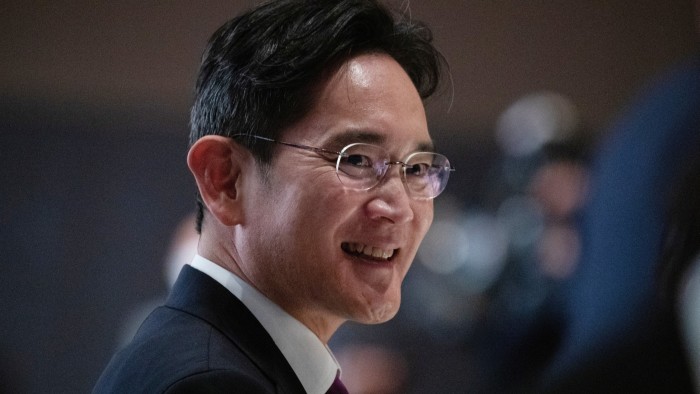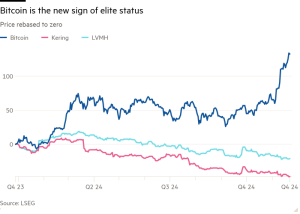Samsung’s princeling heir Lee Jae-yong grapples with corporate crisis

A decade after Lee Jae-yong took the helm at Samsung, the tech giant’s third-generation corporate heir is undergoing the most severe test yet of his business mettle.
The South Korean billionaire heads a conglomerate grappling with problems in its vast semiconductor business, where it has fallen behind in the AI chip race and is poised to launch a management shake-up.
Meanwhile it is dealing with discontent from employees — with Samsung Electronics’ labour union in July going on its first ever strike in a dispute over pay and conditions — and investors, with its shares down more than 30 per cent this year even after a $7.1bn buyback announced last week.
Donald Trump’s US election win and the prospect of trade turmoil have also injected uncertainty into the outlook for the global tech sector and for South Korea, whose economy depends heavily on chip exports and its most valuable company.
“Samsung’s crisis is also Korea’s crisis,” said Park Ju-geun, head of Seoul-based corporate research group Leaders Index.
Park Sangin, professor of economics at Seoul National University, contrasted Lee’s cautious management style with that shown by some of the other family-owned conglomerates that dominate South Korea’s economy. “Unlike the third-generation leaders of Hyundai and LG, Lee has not shown any big or bold decision-making,” he said.
Samsung plays an important role in the global economy as the world’s largest memory chipmaker. But it has fallen behind crosstown competitor SK Hynix in the new growth area of high bandwidth memory chips needed for AI hardware.
The company has also made little progress in fulfilling Lee’s ambition of overtaking Taiwan Semiconductor Manufacturing Company as the world’s leading provider of cutting edge logic chips by 2030. And in sectors such as display and smartphones, which Samsung used to dominate, it is losing market share to Chinese rivals.
Samsung Electronics is now planning an overhaul of the highest ranks of its semiconductor divisions, which analysts say have struggled to adapt to a global chip market being reshaped by the rise of AI.
Lee, 56, grew up in the shadow of his father, second-generation leader Lee Kun-hee, whose mission to improve product quality was encapsulated by employees smashing an entire inventory of 150,000 defective Samsung mobile phones with hammers before throwing them on a bonfire.
“Change everything except your wife and children,” the older Lee famously told a gathering of executives in 1993.
Having spent five years pursuing a doctorate at Harvard Business School, one of Lee Jae-yong’s earliest responsibilities was in 2000 to oversee an expansion into internet businesses, including a network security company and an online financial services aggregator. But the high-profile “e-Samsung” initiative collapsed into insolvency.
Geoffrey Cain, the author of Samsung Rising, a history of the conglomerate, said Lee continued his ascent in the company “without ever having proven himself a balance-sheet success story” despite his father pushing for a “more professional and meritocratic Samsung”.
Lee became chief operating officer at Samsung in 2009, after his father was convicted of illegal share dealings, tax evasion and bribery that had been intended to smooth the path for his son’s succession.
Three years later, Lee assumed the title of vice-chair, becoming the conglomerate’s de facto leader in 2014 when a stroke left his father in a coma. Lee Kun-hee died in 2020.
But the younger Lee soon became embroiled in a fresh Samsung succession scandal after it emerged he had spent millions of dollars funding the equestrian ambitions of the daughter of former South Korean president Park Geun-hye’s spiritual adviser, in order to secure his family’s control of the tech group.
Park and Lee were both jailed on bribery charges, with Lee serving 19 months before being released in 2021 and formally pardoned in 2022. Park was pardoned in 2021.
Lee has since assumed the title of executive chair of Samsung Electronics, although he does not serve on its board, nor that of the conglomerate’s de facto holding company, Samsung C&T.

In February, Lee was acquitted of stock manipulation and fraud charges relating to the merger of two Samsung business units in 2015, raising hopes among investors that this would give him more freedom to tackle the company’s challenges.
“His management activities were constrained because of his legal issues, which meant he was not in a position to make bold decisions,” said Jun Kwang-woo, a former chair of South Korea’s National Pension Service, Samsung Electronics’ second-largest investor.
“He has many good attributes but his hands have been tied by legal risks.”
Jun, who said Samsung’s battery and biopharmaceuticals businesses had achieved impressive growth, added Lee was “a very gentle guy who is congenial and harmonious and listens carefully to what others say”.
In a statement, Samsung defended Lee’s record, saying that the company had continued to be a “world-leading innovator” in consumer electronics and semiconductors, while successfully diversifying through the creation of “new world-class businesses” such as biotech and auto parts.
Lee “has been instrumental to this success, providing the strategic vision for diversified future growth, streamlining the business portfolio to strengthen core competitiveness, and leveraging partnerships with major industry players”, Samsung said.
On Monday, Jun Young-hyun, the head of Samsung’s semiconductor business appointed in May, announced a new $14.4bn chip R&D centre that he said would “lay the foundation for a new leap forward.”
In the meantime, the company hopes to close the gap with SK Hynix with the release of its new “HBM4” memory chip in the second half of 2025, as it seeks to rival SK as a supplier to US AI chip designer Nvidia.
An institutional investor in Samsung Electronics said they would keep faith with the company, noting that it stood to benefit from a future upturn in a global memory sector, powered by demand for AI-related infrastructure.
But they added that Samsung needed to overhaul its opaque governance structure in order to improve performance and lift its share price. The stock hit a four-year low before the buyback was announced this month.
Lee has tried to cultivate a reputation for humility since his release from prison. He has been pictured on social media dining at staff canteens and taking selfies with rank-and-file Samsung employees around the world.
As he said after his pardon in 2022: “I will try harder to be a responsible businessman.”
#Samsungs #princeling #heir #Lee #Jaeyong #grapples #corporate #crisis







